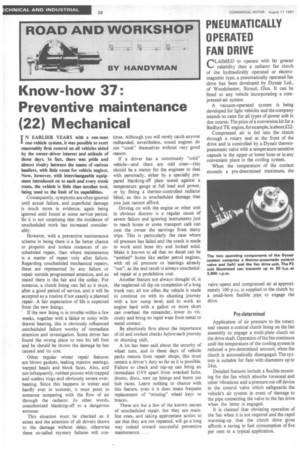Know-how 37: Preventive maintenance (22) Mechanical
Page 40

If you've noticed an error in this article please click here to report it so we can fix it.
T N EARLIER YEARS with a one-man
one-vehicle system, it was possible to exert reasonably firm control on all vehicles aided by the owner-driver interest and attitude of those days. In fact, there was pride and almost rivalry between the teams of various hauliers, with little room for vehicle neglect. Now, however, with interchangeable equipment introduced on to each and every trunk route, the vehicle is little than another tool, being used to the limit of its capabilities.
Consequently, symptoms are often ignored until actual failure, and superficial damage is much more in evidence, again being ignored until found at some service period. So it is not surprising that the incidence of unscheduled work has increased considerably.
However, with a preventive maintenance scheme in being there is a far better chance to pinpoint and isolate instances of unscheduled repair, than where maintenance is a matter of repair only after failure. Regarding unscheduled mechanical repairs, these are represented by any failure or repair outside programmed attention, and as stated there is the fair and the unfair. For instance, a clutch lining can fail as it must, after a good period of service, and it will be accepted as a routine if not exactly a planned repair. A fair expectation of life is expected from the new linings.
If the new lining is in trouble within a few weeks, together with a failed or noisy withdrawal bearing, this is obviously influenced unscheduled failure worthy of immediate attention and investigation. Some driver has found the wrong place to rest his left foot and he should be shown the damage he has caused and its cost.
Other regular winter repair features are blown gaskets, leaking injector seatings, warped heads and block faces. Also, and not infrequently, rubbed pistons with trapped and useless rings and obviously severe overheating. Since this happens in winter and hardly ever in summer, it must point to someone tampering with the flow of air through the radiator. In other words, unauthorized blanking-off to a dangerous extreme.
This situation must be checked as it arises and the attention of all drivers drawn to the damage without delay, otherwise these so-called mystery failures will con
tinue. Although you will rarely catch anyone redhanded, nevertheless, sound engines do not "cook" themselves without very good reason.
If a driver has a notoriously "cold" vehicle—and there are odd ones—this should be a matter for the engineer to deal with personally, either by a specially prepared blanking-off plate tested against a temperature gauge at full load and power, or by fitting a thermo-controlled radiator blind, as this is unscheduled damage that you just cannot afford.
Driving on with the engine or other unit in obvious distress is a regular cause of severe failure and ignoring instruments just to reach home or some transport cafe can cost the owner the earnings from many trips. This is particularly the case where oil pressure has failed and the crank is made to work until bone dry and locked solid. Make it known to all that no diesel can be "ambled" home like earlier petrol engines, with nil oil pressure or bearings already "Out", as the end result is always unscheduled repair at a prohibitive cost.
Another feature not always thought of, is the neglected oil dip on completion of a long trunk run; all too often the vehicle is made to continue on with its shunting journey with a low sump level, and to work an engine hard with a gallon or more short can overheat the remainder, lower its viscosity and bring on rapid wear from metal to metal contact.
Be absolutely firm about the importance of oil and coolant checks before each journey or shunting shift.
A lot has been said about the security of wheel nuts, and in these days of vehicle parks remote from repair shops, this must remain a driver's duty as far as it is possible. Failure to check and nip-up can bring an immediate 0V9 apart from wrecked hubs, drums, discs, torn up linings and burnt out hub races. Leave nothing to chance with this feature, even it it does mean frequent replacement of "missing" wheel keys or braces.
These are but a few of the known causes of unscheduled repair, but they are mainline ones, and taking appropriate action to see that they are not repeated, will go a long way indeed toward successful preventive maintenance. . . .












































































































